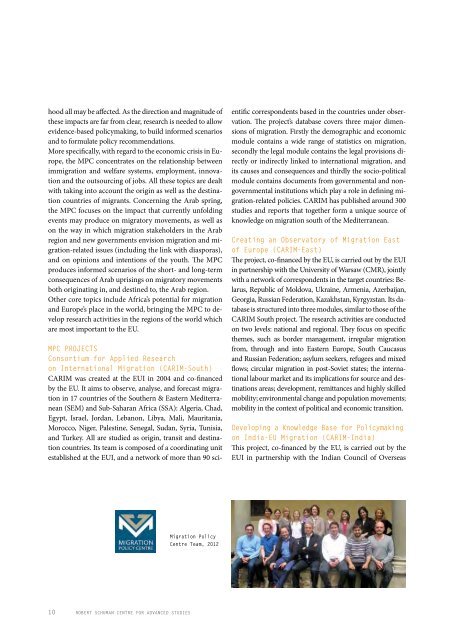robert schuman centre for advanced studies - European University ...
robert schuman centre for advanced studies - European University ...
robert schuman centre for advanced studies - European University ...
Create successful ePaper yourself
Turn your PDF publications into a flip-book with our unique Google optimized e-Paper software.
hood all may be affected. As the direction and magnitude of<br />
these impacts are far from clear, research is needed to allow<br />
evidence-based policymaking, to build in<strong>for</strong>med scenarios<br />
and to <strong>for</strong>mulate policy recommendations.<br />
More specifically, with regard to the economic crisis in Europe,<br />
the MPC concentrates on the relationship between<br />
immigration and welfare systems, employment, innovation<br />
and the outsourcing of jobs. All these topics are dealt<br />
with taking into account the origin as well as the destination<br />
countries of migrants. Concerning the Arab spring,<br />
the MPC focuses on the impact that currently unfolding<br />
events may produce on migratory movements, as well as<br />
on the way in which migration stakeholders in the Arab<br />
region and new governments envision migration and migration-related<br />
issues (including the link with diasporas),<br />
and on opinions and intentions of the youth. The MPC<br />
produces in<strong>for</strong>med scenarios of the short- and long-term<br />
consequences of Arab uprisings on migratory movements<br />
both originating in, and destined to, the Arab region.<br />
Other core topics include Africa’s potential <strong>for</strong> migration<br />
and Europe’s place in the world, bringing the MPC to develop<br />
research activities in the regions of the world which<br />
are most important to the EU.<br />
Mpc projEctS<br />
consortium <strong>for</strong> Applied research<br />
on International Migration (cArIM-South)<br />
CARIM was created at the EUI in 2004 and co-financed<br />
by the EU. It aims to observe, analyse, and <strong>for</strong>ecast migration<br />
in 17 countries of the Southern & Eastern Mediterranean<br />
(SEM) and Sub-Saharan Africa (SSA): Algeria, Chad,<br />
Egypt, Israel, Jordan, Lebanon, Libya, Mali, Mauritania,<br />
Morocco, Niger, Palestine, Senegal, Sudan, Syria, Tunisia,<br />
and Turkey. All are studied as origin, transit and destination<br />
countries. Its team is composed of a coordinating unit<br />
established at the EUI, and a network of more than 90 sci-<br />
10 roBErt ScHuMAn cEntrE For AdVAncEd StudIES<br />
Migration policy<br />
<strong>centre</strong> team, 2012<br />
entific correspondents based in the countries under observation.<br />
The project’s database covers three major dimensions<br />
of migration. Firstly the demographic and economic<br />
module contains a wide range of statistics on migration,<br />
secondly the legal module contains the legal provisions directly<br />
or indirectly linked to international migration, and<br />
its causes and consequences and thirdly the socio-political<br />
module contains documents from governmental and nongovernmental<br />
institutions which play a role in defining migration-related<br />
policies. CARIM has published around 300<br />
<strong>studies</strong> and reports that together <strong>for</strong>m a unique source of<br />
knowledge on migration south of the Mediterranean.<br />
creating an observatory of Migration East<br />
of Europe (cArIM-East)<br />
The project, co-financed by the EU, is carried out by the EUI<br />
in partnership with the <strong>University</strong> of Warsaw (CMR), jointly<br />
with a network of correspondents in the target countries: Belarus,<br />
Republic of Moldova, Ukraine, Armenia, Azerbaijan,<br />
Georgia, Russian Federation, Kazakhstan, Kyrgyzstan. Its database<br />
is structured into three modules, similar to those of the<br />
CARIM South project. The research activities are conducted<br />
on two levels: national and regional. They focus on specific<br />
themes, such as border management, irregular migration<br />
from, through and into Eastern Europe, South Caucasus<br />
and Russian Federation; asylum seekers, refugees and mixed<br />
flows; circular migration in post-Soviet states; the international<br />
labour market and its implications <strong>for</strong> source and destinations<br />
areas; development, remittances and highly skilled<br />
mobility; environmental change and population movements;<br />
mobility in the context of political and economic transition.<br />
developing a knowledge Base <strong>for</strong> policymaking<br />
on India-Eu Migration (cArIM-India)<br />
This project, co-financed by the EU, is carried out by the<br />
EUI in partnership with the Indian Council of Overseas

















